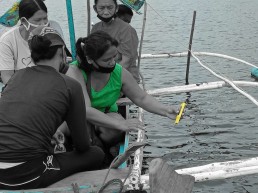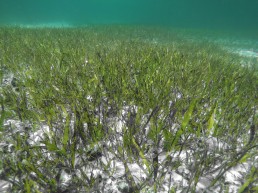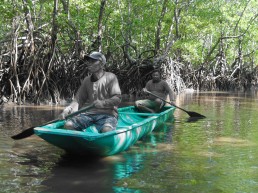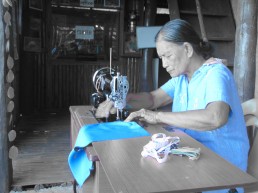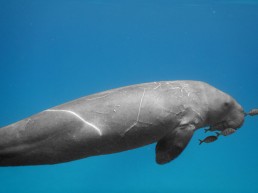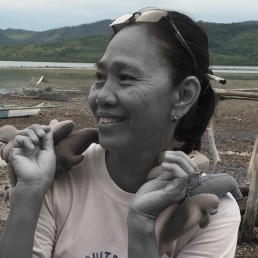
It is a big deal to us, C3 Philippines’s role in providing knowledge through meetings and trainings, particularly in taking care of our oceans and giving importance to the rights of every woman. As members of the Women of the Tagbanua, it was a big change within the entire community of Calawit that we were given the opportunity to recognize our abilities, as women, to oversee a part of our ancestral waters.
ROSITA A. EGUIA
Chairperson
Calawit Women-Managed Area
Management Council
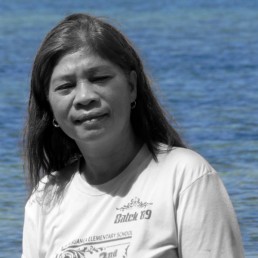
I did not really know anything about caring for and conserving aquatic resources. I did not care—we would simply go out to sea to fish. It never occurred to me that scarcity of fish was happening, but my realization began when I was invited to a meeting in our area, headed by C3 Philippines, to discuss the creation of a Marine Protected Area and its benefits. This was the beginning, and I continued until I felt in my heart the work I was doing; and I want to continue learning and growing so that I can share my knowledge with others.
EMMA M. SEGARINO
Chairperson
Ocam-Ocam Women-Managed Area
Management Council
About
C3 Philippines established its first field station in the Calamianes islands in 2011, focusing on conserving one of the last strongholds of the endangered dugong and is recognised as the national lead agency for research and management of the species.
Dugongs were spotted regularly by marine tour operators but accidental entanglement in fishing gear including fish traps and seaweed aquaculture lines was occurring, threatening to plunge the population into irreversible decline. Since this time C3 has successfully implemented a community-run dugong and seagrass conservation programme which involves local fishers enforcing bans on illegal fishing gear, assisting with Marine Protected Area management and monitoring and feeding back information on dugong sightings to the NGO. The programme involves all stakeholders; Local Government Units, the Department for Environment and Natural Resources, traditional owners, universities and the private sector.
Using its hugely successful environmental stewardship model, C3 has launched successful enterprises linked to dugong conservation, which generate an income and deliver capacity building for employment for women, LGBT and unemployed youth.
C3 employs a wide range of scientific techniques; land-based surveys, underwater surveys and the use of Unmanned Aerial Devices in monitoring the dugong population around the Calamianes islands to ensure it continues to grow and adapt in the face of increasing development in the region. C3 now has further offices in Taytay and Puerto Princesa, extending its successful community coastal management programmes across the entire province of Palawan, the Philippines’ last frontier for biodiversity.
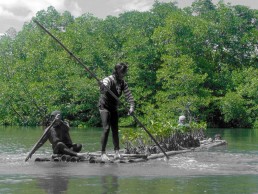
Commitment
C3 Philippines is truly community centred as its name implies. We’re not a NGO which comes and goes to rural communities in order to implement top-down projects conceived in costly offices in cities by development personnel. We’re grassroots, located in the community and all of our ideas come from the community and complement the country’s overarching sustainable development goals.
We have developed successful environmental stewardship models with proven impact. Our job is to adapt, replicate and upscale what we do to reach more and more communities and areas of critical biological importance.
We only promise to deliver effective, sustainable and impactful conservation and development at the best possible price. We can deliver at much lower cost than most NGOs because we are locally-based, locally-run and have hundreds of community volunteers, well-researched suppliers, and a policy of zero or minimal waste.
The international community must admit that conservation has not been successful to date. We are still losing hundreds of species and swathes of habitat each year. With limited funds and time, we must shift our paradigm away from neocolonial conservation approaches and waiting for data to inform decisions. Instead, we need to capacitate communities to manage and monitor key biodiversity areas with their own drive and commitment before it is too late.
It is also time for donors to take a good, hard look at value for money when it comes to future conservation investments. We must move away from an approach that historically supported short-lived outcomes with high administrative cost–one that, unfortunately, led to corruption and the external dependence of local institutions.
10
partner indigenous people communities
29
policies and agreements supported
30
community watch reporters
57
partner barangays
67
Local Monitoring Team members
135
Community Savings (COMSCA) members
230
Management Bodies members
230
PEER Educators (youth, women, & men)
1,084
fisher beneficiaries
1,500
Peoples’ Organization members
3,000
hectares mangrove forest rehabilitated
5714.60
hectares total of Local Conservation Areas (LCAs)
5,967
registered fishers
15,068
hectares total area protected by MPAs and WMAs
Contact C3 Philippines
Busuanga OfficeSalvacion, Busuanga, Palawan, 5317 Philippines
Taytay Field OfficePurok 6 San Lorenzo, PoblacionTaytay, Palawan, 5312 Philippines
C3 Philippines (C3PHILIPPINES INC.), in accordance with the Corporation Code of the Philippines, is registered as a non-profit organization in the Philippines under the Securities and Exchange Commission with Company Registration No. CN201115227.

